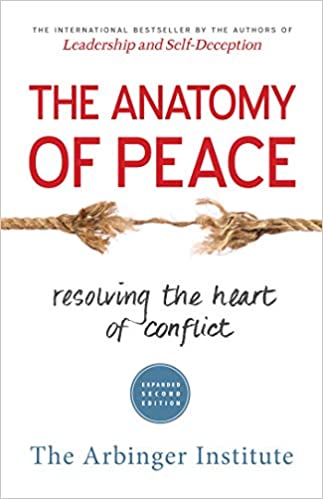We spend most of our time dealing with things that are going wrong. We should spend much more time and effort helping things go right.

Beneath all behaviours is a person with either a 'heart at peace' or a 'heart at war'.
Heart at Peace: 'I-Thou' relationship
Heart at War: 'I-It' relationship

They prefer to call most of the things we call conflict: collusion. This is a conflict where the parties are inviting the very things they're fighting against.
Often each person in a conflict then enlists allies onto his or her side. This is escalation.
If we are going to find lasting solutions to difficult conflicts or external wars we find ourselves in, we first need to find our way out of the internal wars that are poisoning our thoughts, feelings, and attitudes toward others. If we can’t put an end to the violence within us, there is no hope for putting an end to the violence without.
From Peace to War

When we choose to betray out sense / desire we make a choice to go to war.
When we see others as objects we start to live within a box.
These are four common styles of justification that we use to betray our senses.

We are in the Better-Than box when we don't see others as people because we see them prejudicially as less than we are - less skilled perhaps, or less important, less knowledgeable, less righteous, and so on.

Then there is the I-Deserve box. When we feel mistreated, victimised, entitled, deprived, resentful.
People who go around feeling better-than generally feel entitled to a lot of things, so these two styles of justification often come together.

Another is the Must-Be-Seen-As box, where worry about being seen as likeable. This stops us from being able to do the helpful or right thing that might be something the other person won't like.

The Worse-Than box is a justification where we feel that we are a bad person.
From War to Peace

This is a guide to getting out of a box.
- Looking for the signs of the box (blame, justification, horribilization, common box styles, etc.)
- Find an out-of-the-box place (out-of-the-box relationships, memories, activities, places, etc)
- Ponder the situation anew (i.e., from this out-of-the-box perspective) Ask:
- What are this person's or people's challenges, trials, burdens, and pains?
- How am I, or some group of which I am a part, adding to these challenges, trials, burdens and pains?
- In what other ways have I or my group neglected or mistreated this person or group?
- In what ways are my better-than, I-deserve, worse-than, and must-be-seen-as boxes obscuring the truth about others and myself and interfering with potential solutions?
- What am I feeling I should do for this person or group? What could I do to help?
- Act upon what I have discovered; do what I am feeling I should do.
This is how peace can be recovered inwardly, even when we are surrounded by war.
Spreading Peace

The most important part of helping things go right is getting out of the box ourselves.
Trying to communicate the reasons for actions is teach and communicate.
It is no good trying to teach if I myself am not listening and learning. This keeps reminding us that we might be mistaken in our views and opinions. It keeps inviting us towards humility. It reminds us that the person or group we wish to change may not be the only one who needs to change!
In order to be able to learn from people we need to have a strong relationship. Hence build the relationship.
We want the people who have the biggest influence on the person's life to be on side. Hence we build relationships with others who have influence.
Lesson 1
Most time and effort should be spent at the lower levels of the pyramid.
Lesson 2
The solution to a problem at one level of the pyramid is always below that level of the pyramid.
Lesson 3
Ultimately, my effectiveness at each level of the pyramid depends on the deepest level of the pyramid i.e. my way of being.

